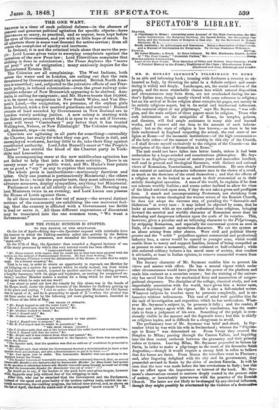THE ONE WANT.
ganost in a time of such political dulness—in the absence of meseral and genuine political agitation for specific objects—have- grievances so many, so practical, and so urgent, been kept before the eyes of Government, and yet with so little hope of result. In en quarters there is some vast demand for active service; from all comes the complaint of apathy and inertness. In Ireland, it is not the criminal trials alone that move the peo- ple ie Lord Lucan gives voice to sweeping complaints against the • operation of the new Poor-law ; Lord Fitzwilliam complains that nothing is done in colonization ; the Times deplores the " sauve old pent" style of emigration ; many anxiously inquire for the Encumbered Estates Bill. The Colonies are all complaining. The West Indians, both across the water and in London, are calling out that the ruin threatened by Government might be averted. British North Ame- rica is unsettled ; and, subjected to the privative effects of our Free- trade policy, is refused colonization—even the great railway colo- nization scheme of New Brunswick appearing to be shelved. Aus- tralia is calling for emigrants; and Mr. Hawes boasts that 10,0001. is to be spent on emigration to New South Wales, and Van Die- men's Land,—the emigration, we presume, of the orphan girls from Ireland, with a few married guardians and matrons ? Ruined owners of land unceded by Government in New Zealand are in London vainly seeking justice. A new colony is starting with the fairest promises; except that it is open to us to ask if Govern- ment will treat " Canterbury" any better than it has treated Wellington, Nelson, or New Edinburgh? The Colonies complain, ask, demand, urge—in vain.
Chartists are agitating in all parts for something—ostensibly the Charter, but really fdr what they can get. Trade is dull, and unemployed workmen, having little to do, take their fling against constituted authority. Lord John Russell's sneer at " the People's Charter" has stirred the blood of the Chartist party in York- shire and Lancashire.
His accompanying sneer at the new middle-class agitation has not failed to help that into a little more activity. There is an uneasy sense of some public want, and Mr. Hume's four points are as good a " cry " as any to express that uneasiness. The whole press is insubordinate—mutinously facetious and bitter. Only one journal is pertinaciously Ministerial ; the others dare not be so : to suit the popular taste, they must advance views, advocate measures, display sympathies, anything but Ministerial.
Parliament is not at all strictly in discipline: Dr. Bowring can beat Ministers twice in an evening, and Lord Lucan can possess the House of Lords against them. In all these instances—a few out of many—the several distinct sections of the community are exhibiting the one universal feel- ing, that the country is afflicted with a Government too feeble to lead- or serve it. All these different expressions of discontent may be translated into the one common term, " We want a Government."


























 Previous page
Previous page